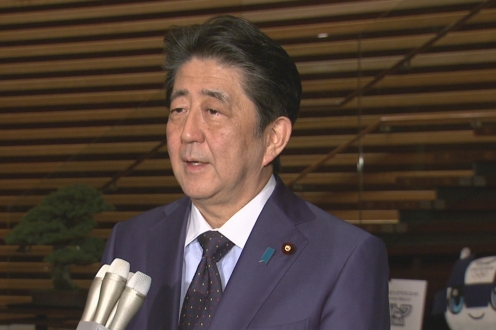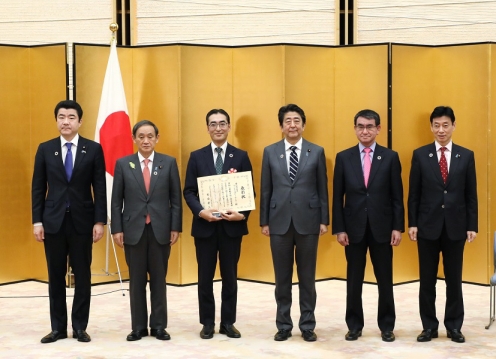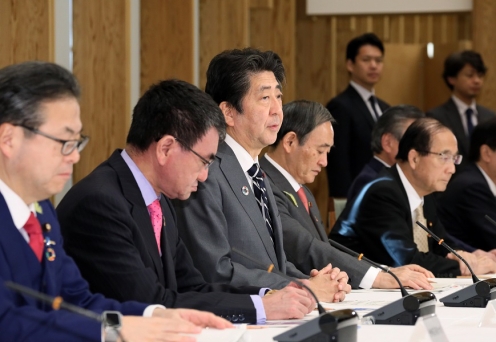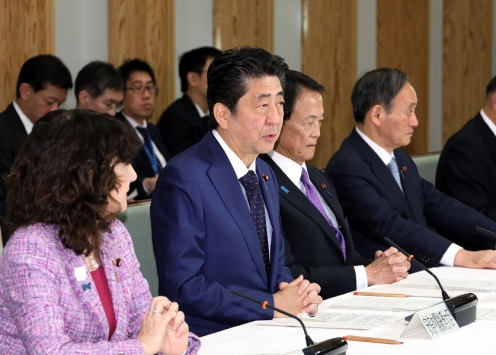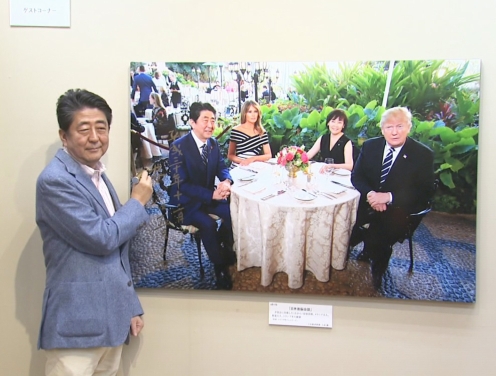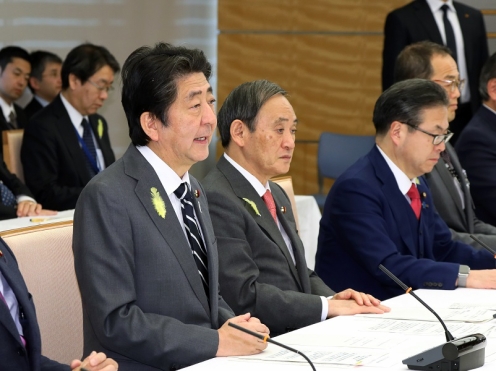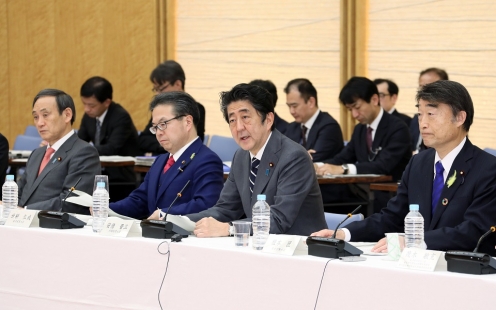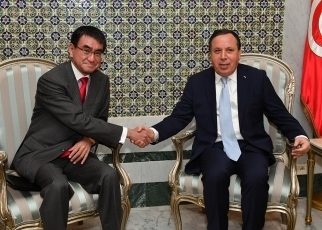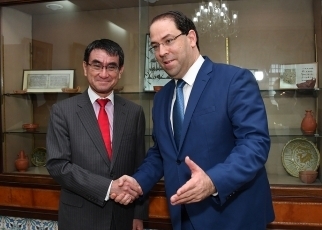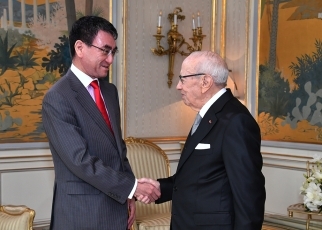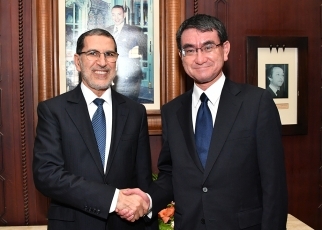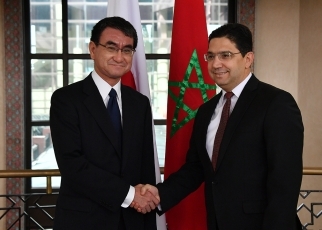Press Conference on the Six Years since the Inauguration
Cabinet Secretariat, Tuesday, December 25, 2018
[Provisional Translation]
On December 25, 2018, Prime Minister Shinzo Abe held a press conference at the Prime Minister's Office.
In regard to the six years since the inauguration, the Prime Minister said,
“Since six years ago when we retook control of the reins of government, we have been exerting utmost efforts day by day, with the intent to create a Japan abounding with hope, to fulfill the mandate given to us by the people. Those days have built up to create six years. This is something deeply moving.
While we experienced many disasters this year, it was also a major turning point as seen in the working-style reform for domestic affairs, and the Japan-Russia Summit Meeting for diplomacy. As we enter our 7th year in power next year, most significantly, there will be the succession of the Imperial throne. I would like next year to be one which paves the way for the future of Japan, and Japan to truly shine brilliantly.
No matter how many years pass, I will exert every effort with a sense of urgency for the nation and the people of Japan. Thank you very much.”
Furthermore, the Prime Minister also said,
“I do not consider it a secret and I would say it is the consequence of daily efforts. Basically, when the first Abe Cabinet was formed12 years ago, I over-exerted myself and our Cabinet ended after just one year. That setback and experience have been a valuable gain, looking back at the six years since the inauguration. Thank you very much.”
Conferment Ceremony for the Japan SDGs Award
Cabinet Secretariat, Friday, December 21, 2018
[Provisional Translation]
On December 21, 2018, Prime Minister Shinzo Abe held the conferment ceremony for the second Japan SDGs Award at the Prime Minister’s Office.
The Prime Minister said in his opening address,
“I would like to express my heartfelt congratulations to the recipients of the second Japan SDGs Award today. All the recipients are front runners who are creating the vision of a prosperous and vibrant future, through the promotion of the SDGs.
An SME that contributes to the creation of a sound material-cycle society by manufacturing liquid animal feed using food waste. A municipality that has become a national and international model for its high rate of resource recycling. Students from a girls’ junior high and high school who are boldly trying to solve the problem of ocean waste in their region. A long-standing company that has worked to foster traditional culture in its local communities under sustainable management practices over hundreds of years. A media organization, a medical facility, and a regional financial institution that are supporting momentum for the promotion of the SDGs. I could not possibly introduce every awardee here. I am very pleased to see that not only the awardees but also the groups that applied for the award, as well as their initiatives, are even more diverse and numerous than last year.
I would like to conclude my congratulatory remarks by expressing my own heartfelt hope that this Award will inspire many diverse actors, including the groups awarded today, to work with partners and combine their wisdom and activities to promote the SDGs even further. My sincere congratulations once again to you all today.”
Sustainable Development Goals (SDGs) Promotion Headquarters
Cabinet Secretariat, Friday, December 21, 2018
[Provisional Translation]
On December 21, 2018, Prime Minister Shinzo Abe held the sixth meeting of the Sustainable Development Goals (SDGs) Promotion Headquarters at the Prime Minister’s Office.
During the meeting, there was discussion on the SDGs Action Plan 2019 and the second Japan SDGs Award.
Based on the discussions, the Prime Minister said,
“The Abe Cabinet will contribute to the development of human resources and nation building around the globe based on the belief that we must realize a society where no one is left behind in a world that is changing at an unprecedented speed. The underlying theme is nation-building toward a prosperous and dynamic future, a Japan that our children and grandchildren are proud of, and Japan as a leading country of the international community.
First, we will promote nation-building toward a prosperous and dynamic future. We will spread trends towards the promotion of the SDGs from major corporations to small- and medium-sized enterprises (SMEs) and spread the dynamism of the SDGs across the country. We will make use of the latest innovations in science and technology and work toward the vitalization of regions via smart agriculture, forestry, and fishery industry measures, as well as the creation of a sound material-cycle society through countermeasures for plastic waste in the oceans. We will exert every effort for the creation of a sustainable and resilient country in order to respond to national disasters, which are increasing in intensity due to climate change, as we saw this year.
Second, we will boldly invest in children, who bear the future, and women, in order to create a Japan that our children and grandchildren are proud of, towards the advent of the 100-year life society. We will jointly host the World Assembly for Women (WAW!) and Women 20 (W20) in March, and draw the attention of the world to Japan’s initiatives towards the creation of societies in which all women shine. We will set up a platform for the promotion of the SDGs centering on the next generation such as students and young professionals in order to make use of their voices and efforts.
Third, we will communicate Japan as a leading country in the international community to the rest of the world. Next year, Japan will host the G20 Summit on Financial Markets and the World Economy and the Seventh Tokyo International Conference on African Development (TICAD 7). We will demonstrate Japan as a strong leader to promote the SDGs to the international community, making use of these opportunities where Japan caught the attention of the world. Through the G20 and TICAD 7, we will lead initiatives on the creation of high quality infrastructure, disaster prevention, measures against plastic waste in the oceans, climate change, and other issues. We will prioritize women, health, and education as the foundations for human security and development of human resources.
As the G20 president, we will communicate the outcomes of these efforts to the international community at the High-Level Political Forum on Sustainable Development that is set to be held during the United Nations General Assembly in September of next year.
Based on this, I ask all of the relevant ministers to make and strengthen concrete actions toward our next SDGs Promotion Headquarters meeting, which will be held just before the G20 meeting, so as to demonstrate Japan’s leadership.”
Japan-Indonesia Summit Telephone Talk
Foreign Affairs, Tuesday, December 25, 2018
On December 25, commencing at around 5:30 p.m. for approximately 10 minutes, Mr. Shinzo Abe, Prime Minister of Japan, held a summit telephone talk with H.E. Mr. Joko Widodo, President of the Republic of Indonesia. The overview of the telephone talk is as follows. The telephone talk was attended by Mr. Yasutoshi Nishimura, Deputy Chief Cabinet Secretary, Mr. Kotaro Nogami, Deputy Chief Cabinet Secretary and others.
1. At the beginning, Prime Minister Abe explained that he was deeply saddened to learn of the large number of precious lives that were lost as a result of the tsunami that struck the Sunda Strait, and the devastating damage that was caused by the tsunami, and on behalf of the Government of Japan and Japanese citizens he extended his heartfelt condolences to those who lost their lives and his sympathies to all of those affected. Prime Minister Abe also stated that Japan is ready to provide the utmost assistance necessary, including the provision of emergency relief goods. In addition, Prime Minister Abe noted that both Japan and Indonesia are disaster-prone countries, and so mutually understand the enormity of such disasters. Prime Minister Abe stated that Japan stands constantly beside Indonesia as it overcomes this difficult time.
2. In response, President Joko expressed gratitude for Japan’s warm words, and explained that for the time being Indonesia is responding to the disaster and concentrating on saving lives and evacuating residents.
Headquarters for Promoting Decentralization Reform
Cabinet Secretariat, Tuesday, December 25, 2018
[Provisional translation]
On December 25, 2018, Prime Minister Shinzo Abe held the 12th meeting of the Headquarters for Promoting Decentralization Reform at the Prime Minister’s Office.
During the meeting, discussion took place on the measures to address the proposals received from the regions in 2018 and other matters.
Based on the discussion, the Prime Minister said,
“Japan will not have vitality unless its regions do as well. The Abe Cabinet is powerfully promoting a series of decentralization reforms for the regions based on their own initiatives. The measures approved in this headquarters last year, which enable effective and faster issuance of Disaster Victim Certificates, swiftly demonstrated its significant benefit in responding to the natural disasters that occurred one after another throughout the summer this year.
This year, as the previous year, we have responded to 90% of the proposals submitted to us, including support for children and child raising, and investment for regional revitalization, as a result of our detailed considerations with our fundamental position of listening thoroughly to the voices of the regions.
For example, we allowed municipalities to operate after-school clubs under their own responsibility reflecting the actual conditions in the designated areas, making the set of regulations that clubs need to follow more flexible, so as to smoothly secure places where children can be engaged after school.
Furthermore, as overseas tourists continue to increase throughout Japan, we will conduct reviews regarding museums, which were previously under the sole authority of the designated Boards of Education, so that these facilities can be proactively utilized as tourism resources by the decision of respective municipalities.
I ask all the ministers to exercise strong leadership based on the guidelines determined today and steadily realize each of the measures.”
59th Press Photo Exhibition 2018
Cabinet Secretariat, Saturday, December 22, 2018
[Provisional translation]
On December 22, 2018, Prime Minister Shinzo Abe visited the 59th Press Photo Exhibition 2018 being held in Tokyo.
After viewing the photographs, the Prime Minister said,
“This year, we saw many incidents happen, including a series of disasters. On the other hand, we had opportunities to see young power succeeding on the world stage in the likes of athletes such as Mr. Hanyu, Mr. Ohtani and Ms. Naomi Osaka.
Turning our eyes to politics, there was a historic U.S.-North Korea Summit Meeting, and also a Japan-Russia Summit Meeting that signaled a turning point to accelerate the negotiation of a peace treaty. I believe this year marked a major turning point. As I just wrote my signature over there, I secured a new three-year term as President of the Liberal Democratic Party of Japan (LDP) in the Presidential Election of the Party.
Next year, I would like this turning point to steer a positive direction for Japan and the world. Next year, most significantly, we will see the historic succession to the Imperial throne, as well as the G20 Summit on Financial Markets and the World Economy. I would like next year to be one which paves the way for the future of Japan. Thank you very much.”
Meeting of the Nuclear Emergency Response Headquarters
Cabinet Secretariat, Friday, December 21, 2018
[Provisional Translation]
On December 21, 2018, Prime Minister Shinzo Abe held the 47th meeting of the Nuclear Emergency Response Headquarters at the Prime Minister’s Office.
During the meeting, there was discussion on the draft plan for the lifting of evacuation orders and the return and housing of residents in zones designated for reconstruction and recovery.
Based on the discussion in the meeting, the Prime Minister said,
“Today, we approved the basic plan for the lifting of evacuation orders and the return and housing of residents in zones designated for reconstruction and recovery. By determining a specific path toward the lifting of evacuation orders in difficult-to-return-zones, we intend to further accelerate the development of towns that the people of this region hope for.
In line with this approval, the Government will work in unity to implement more tailored measures to protect against radiation, which fit in with the actual residents’ conditions, and to promote the creation of an environment in which people can return with peace of mind through measures such as decontamination work and infrastructure development.
The Government will exert every effort on the front lines beyond this reconstruction and revitalization period until the day we achieve the reconstruction of Fukushima.
I want the relevant ministers to continue to maintain close collaboration, while following through your focus on the frontlines, and do everything in your power for the reconstruction and revitalization of Fukushima, with the mindset that each and every Cabinet member is Minister for Reconstruction.”
Council on Mid-Career Recruitment and the Recruitment of Experienced Professionals
Cabinet Secretariat, Friday, December 21, 2018
[Provisional Translation]
On December 21, 2018, Prime Minister Shinzo Abe attended the first meeting of the Council on Mid-Career Recruitment and the Recruitment of Experienced Professionals at the Prime Minister’s Office.
The Prime Minister said in his opening address,
“Thank you very much for gathering here today in the midst of your busy schedules.
The reform to a social security system oriented to all generations is the biggest challenge for the Abe Cabinet as the declining birthrate and the aging of the population are rapidly advancing. In light of that, we have gathered here today managers of companies that are actively pursuing mid-career recruitment and the recruitment of experienced professionals and established this Council on Mid-Career Recruitment and the Recruitment of Experienced Professionals.
In this council, I would like all of you, the top managers, to introduce your pioneering efforts and I myself will stand at the forefront and lead a nation-wide movement towards the expansion of mid-career recruitment and the recruitment of experienced professionals.
Setting our sights on a 100-year life society, it is necessary to create a society in which people can reap success twice or more in different fields in the designated stage of their lives, by pursuing multiple career paths, so that all of them remain working actively. I believe that we must correct the practice that their education and career choice in their teens and 20s largely decide their lives’ paths.
To that end, we should develop multiple career ladders so that people advance their careers in line with their skills and achievements, regardless of their age or gender, by expanding mid-career recruitment and the recruitment of experienced professionals. I would like to continue our efforts to create a society in which people make their decisions more flexibly about their work styles and work locations and attempt new challenges multiple times according to their stage of life, and a society in which women and the elderly participate even more actively.
The top managers in attendance today are all those who position the expansion of mid-career recruitment and the recruitment of experienced professionals as an important pillar of their companies’ growth strategies and human resource strategies under this leading philosophy, and are actively making efforts to reform corporate culture and our culture at large. I would like to hear in detail about your initiatives you are currently promoting.
Furthermore, we would like to hear from small- and medium-sized enterprises (SMEs), which are actively promoting mid-career recruitment and the recruitment of experienced professionals, about human resource needs and their efforts at the next meeting, which would be held early next year.
On top of that, by widely publicizing the state of various pioneering efforts and sharing them across the entire business community, I expect each company to work on the expansion of mid-career recruitment and the recruitment of experienced professionals in a way that suits them as well as intending to give due consideration over the support measures for SMEs to that end.
I ask Minister of Economy, Trade and Industry Seko and Minister of Health, Labour and Welfare Nemoto to submit proposals, which take into account the leading cases introduced today, for the discussions at the Council on Investments for the Future, and incorporate them into the implementation plan for the Growth Strategy to be approved next summer, while working together with Minister Motegi.”
Japan-Tunisia Foreign Ministers' Meeting
Foreign Affairs, Wednesday, December 26, 2018
On December 26th, commencing at 11:00 AM (local time, 7:00 PM Japan time) for approximately 90 minutes, Mr. Taro Kono, Minister for Foreign Affairs, held a meeting with H.E. Mr. Khemaies Jhinaoui, Minister of Foreign Affairs of Tunisia during his visit to Tunisia. The overview of the meeting is as follows. Following the meeting, a working luncheon hosted by Minister Jhinaoui was held.
1 In the beginning, H.E. Mr.Jhinaoui welcomed Minister Kono's visit to Tunisia, expressed his appreciation to the cooperation Japan has extended for the development of Tunisia to date, and said he wished to further develop the partnership with Japan, which has been a traditionally friendly country for Tunisia.
2 In response, Minister Kono stated that his visit to Tunisia is the first visit for a Foreign Minister of Japan in many years and it is for the first time for him to visit Tunisia personally in 13 years, for which he felt very impressed. He commended the efforts of Tunisia toward reform and development, and conveyed his intention to continue to contribute to the stabilization of Tunisia.
3 Minister Kono stated that, taking the opportunity of his visit, he wished to elevate the good bilateral relationship to a new level. The two Ministers affirmed the achievements of bilateral cooperation, and in order to retain the momentum, shared the view for engaging in multi-layered policy dialogues (such as the holding of the 10th Japan-Tunisia Joint Committee early next year), promoting cooperation in anti-terrorism and the security area (such as the holding of the 3rd Anti-terrorism and security dialogue at an appropriate time next year), and to foster further close relations in the economic area. The two Ministers also shared the view to start negotiations for an investment agreement and a taxation agreement at an early time, in order to support the further entry of Japanese businesses into Tunisia.
4 The two Ministers also confirmed to cooperate in the international arena, including working together for the successful holding of TICAD 7. The two also exchanged views on the situations in East Asia and the Middle East region.
Foreign Minister Kono Pays a Courtesy Call on Head of Government of the Republic of Tunisia Chahed
Foreign Affairs, Wednesday, December 26, 2018
On December 26th, commencing at 3:15 PM (local time, 11:15 PM December 26th Japan time) for approximately 20 minutes, Mr. Taro Kono, Minister for Foreign Affairs, paid a courtesy call on H.E. Mr. Youssef Chahed, Head of Government of the Republic of Tunisia, during his visit to Tunisia. The overview of the meeting is as follows.
1 In the beginning, H.E. Mr. Chahed welcomed Mr. Kono's visit to Tunisia. In response, Minister Kono stated that this is the first time for him to be here in 13 years since the last time he accompanied his farther Mr. Yohei Kono who visited Tunisia in 2006 as the Speaker of the House of Representatives, and that he would like to take advantage of this opportunity in order to upgrade the relationship between the two countries. In addition, Minister Kono expressed his respect to Tunisia's strong determination toward the reforms which achieved the democratization of the country through "Arab Spring", and expressed his intention to further promote the entry of Japanese businesses to Tunisia as well as to contribute to supporting stability in the country as a cordial friend.
2 In response, H.E. Mr. Chahed stated that Japan is strategically important for Tunisia, expressing his appreciation to Japan's support for the democratization since 2011, and expressed his wish to elevate bilateral relations including economic and business perspectives to a next level and to learn from experience of Japan.
3 Moreover the two shared the views on further promoting the cooperation between the two countries in a wide range of areas, including politics, economy, investment, tourism, human resources development, and human exchanges.
Foreign Minister Kono Pays a Courtesy Call on H.E. Mr. Beji Caid Essebsi,
President of the Republic of Tunisia
Foreign Affairs, Wednesday, December 26, 2018
On December 26th, commencing at 10:15 AM (local time, 6:15 PM December 26th Japan time) for apporiximately 15 minutes, Mr. Taro Kono, Minister for Foreign Affairs, paid a courtesy call on H.E. Mr.Beji Caid Essebsi, President of the Republic of Tunisia during his visit to Tunisia. The overview of the meeting is as follows.
1 In the beginning, H.E. Mr. Essebsi welcomed Minister Kono’s visit to Tunisia, and stated that taking his visit as an opportunity he would like to further strengthen the partnership between Tunisia and Japan.
2 In response, Minister Kono stated that his visit to Tunisia is the first time in 8 years as a Foreign Minister for Japa, and expressed his respect for the strong determination of Tunisia which achieved transition to democracy through the “Arab Spring”. Minister Kono also said that Japan seeks to further develop the relationship between Tunisia and Japan.
3 Minister Kono noted that recently Japanese enterprises are accelerating the development of their businesses in Tunisia, and expressed his intention to further promote the entry of Japanese businesses by, among other things, setting up legal frameworks. In response, H.E. Mr. Essebsi stated that he welcomed the further expansion of Japanese companies.
4 Moreover, the two confirmed to expand the dialogue on regional and international situations.
Foreign Minister Kono Pays a Courtesy Call on H.E. Mr. Saad Dine EL OTMANI, Head of Government of the Kingdom of Morocco
Foreign Affairs, Monday, December 24, 2018
On December 24th, commencing at 4:00 PM (local time, 00:00 AM December 25th Japan time) for approximately 25 minutes, Mr. Taro Kono, Minister for Foreign Affairs, paid a courtesy call on H.E. Mr. Saad Dine EL OTMANI, Head of Government of the Kingdom of Morocco, during his visit to Morocco. The overview of the meeting is as follows.
In the beginning, H.E. Mr. El Otomani stated that the relationship between Morocco and Japan has been very well for a long time, and that Japan is a very important partner for Morocco in Asia. In response, Minister Kono indicated that the two countries have enjoyed great relationship based on the close relationship between the Imperial and Royal families in both countries, though his visit is the first time in 31 years as a Foreign Minister for Japan in a bilateral context. Minister Kono also stressed that many Japanese companies expand their business in Morocco, and expressed his hope that mutual visits of both Foreign Ministers will be more active.
Moreover the two exchanged opinions on bilateral relations and cooperation in the international arena, and confirmed that the two countries will also cooperate to hold TICAD 7 successfully.
Japan-Morocco Foreign Ministers’ Meeting
Foreign Affairs, Monday, December 24, 2018
On December 24th, commencing at 11:05 AM (local time, 7:05 PM Japan time) for approximately 3 hours and 15 minutes, Mr. Taro Kono, Minister for Foreign Affairs held a meeting with H.E. Mr. Nasser BOURITA, Minister of Foreign Affairs and international cooperation of the Kingdom of Morocco in Rabat, Morocco during his visit. The overview of the meeting is as follows.
In the beginning, Minister Kono stated that the relationship between Japan and Morocco is extremely well based on exchanges between the Imperial and Royal families, and that Japan appreciates the important role which Morocco is playing in the development and stability of the Middle East and North Africa region under the wise and great leadership of His Majesty King Mohammed VI. Minister Kono said that Morocco is an extremely important partner for Japan in strengthening its diplomacy in the Middle East and Africa.
Minister Kono also stated that, as a gateway to Europe and Africa, the number of Japanese companies in Morocco is the second largest in Africa, and as such Morocco is an important partner for Japan. Minister Kono expressed his intention to further promote the entry of Japanese businesses to Morocco by, among other things, setting up legal frameworks to support corporate activities.
Furthermore, the two Ministers exchanged opinions on how the two countries can cooperate in the TICAD process based on the idea that the two countries can play a major role in the development of Africa in mutual cooperation. Minister Kono expressed his expectation for Morocco’s positive participation to TICAD 7 next August.
The two Ministers exchanged views on the situations in East Asia and the Middle East, and confirmed the importance of working closely with each other in the international arena.
Speech by Governor Kuroda at the Meeting of Councillors of Nippon Keidanren (Japan's Economic and Price Developments and Future Prospects)
Bank of Japan, Wednesday, December 26, 2018
Introduction
It is a great honor to have this opportunity to address such a distinguished gathering of business leaders in Japan today.
This is the sixth time I have the occasion to give a speech here wrapping up the year. Today, I would first like to talk about the Bank of Japan's view on domestic economic and price developments while looking back on the past six years. Next, I will elaborate on efforts that firms have made so far toward improving productivity, mainly in response to labor shortage, and will then outline future prospects. Lastly, I will explain the Bank's conduct of monetary policy.
Summary of Opinions at the Monetary Policy Meeting on December 19 and 20, 2018
Bank of Japan, Friday, December 28, 2018
I. Opinions on Economic and Financial Developments
Economic Developments
・Japan's economy is expanding moderately, with a virtuous cycle from income to spending operating. Going forward, it is likely to continue expanding, mainly against the background of highly accommodative financial conditions and the underpinnings through government spending.
・The effects of trade friction and the global decline in stock prices on Japan's economy have
been limited so far, and the baseline scenario that the economy will continue its moderate expansion is maintained.
・Although the second preliminary estimate of real GDP for the July-September quarter registered negative growth, which was below market expectations, this is basically likely to be mainly due to the effects of temporary factors such as natural disasters.
・Although Japan's GDP for the July-September quarter registered negative growth, the basic mechanism for moderate economic expansion is maintained, as confirmed, for example, by the Tankan (Short-Term Economic Survey of Enterprises in Japan) showing that there has been no change in the increasing trend in business fixed investment. On the other hand, downside risks to the outlook have been heightening amid growing uncertainties in the global economy, including the trade friction between the United States and China.
・Japan's economy is expanding moderately. While tight supply-demand conditions have been encouraging expansion of production capacity, it is necessary to pay attention to increasing downside risks to overseas economies.
・As the restoration of infrastructure has progressed following the successive natural disasters, production and exports have picked up after declining. However, we cannot be optimistic regarding the outlook for economic activity since cautious views have been increasing against the background of the trade friction between the United States and China.
・While moves to increase investment and wages have started to be seen in the corporate sector, a challenge lies in the household sector in that the mechanism of the virtuous cycle from income to consumption expenditure has been operating weakly. Attention should be paid to this point in considering the effects of the scheduled consumption tax hike on economic activity and prices.
・As for overseas economies, positive momentum in domestic demand has been maintained in many economies. With regard to the outlook, overseas economies are expected to continue growing firmly on the whole.
・Although we are no longer in an ideal situation of so-called synchronous growth of the global economy, the virtuous cycle in the economy has been maintained, as seen, for example, in domestic demand continuing to be firm in many economies.
・Overseas economies have started to show signs of decelerating, with differences among regions becoming clearer. If the deceleration and downturn in these economies become evident, developments in fiscal and monetary policies in each economy will be important.
・Regarding the outlook for the global economy, risks have been tilted to the downside on the whole amid heightening uncertainties and a prevailing view that such situation will be protracted.
・Downside risks to economic activity have been heightening. Looking at the latest data on trade activities in China, both exports and imports marked negative growth on a month-on-month basis, which possibly indicates a deceleration in the Chinese economy. Turning to Japan's economy, it cannot be said that the actual condition of restoration-related demand and production stemming from natural disasters has been strong. In addition, the recovery in exports to China has been weak, and exports as a whole also have shown weak developments.
・In China, defaults of private firms have been increasing, and authorities have been requesting that banks increase lending in order to resolve the difficulty in funding. Developments in private firms' funding under these circumstances warrant close attention.
Prices
・The year-on-year rate of change in the consumer price index (CPI) is likely to increase gradually toward 2 percent, mainly on the back of the output gap remaining positive and medium- to long-term inflation expectations rising.
・The basic mechanism in which a positive output gap is a driver for moderate inflation has been operating, as seen, for example, in the diffusion index (DI) for output prices in the Tankan having remained within positive territory not only for large but also small enterprises, with tight labor market conditions continuing.
・A positive output gap has exerted upward pressure on prices and the year-on-year rate of change in the CPI has been positive. However, the impact of a decline in crude oil prices on inflation will be a matter of concern going forward.
・While upward pressure on inflation resulting from a positive output gap and the constraining effects on inflation accompanying factors such as a rise in productivity have affected each other in a complex manner, a rise in inflation has been delayed and uncertainties regarding the outlook have been heightening.
・In the July Outlook for Economic Activity and Prices (Outlook Report), it was mentioned that "many of the factors that have been delaying inflation are likely to be resolved gradually." Looking at subsequent developments, however, it is likely to still take more time for these factors to be resolved.
・There is a low possibility that the output gap will continue to widen within positive territory going forward, and a decline in crude oil prices also will contribute to further delaying the achievement of the price stability target.
II. Opinions on Monetary Policy
・Although it will take time to achieve the price stability target, it is necessary to persistently
continue with the current powerful monetary easing as the momentum toward 2 percent
inflation is maintained.
・The Bank should continue with the current monetary policy stance with the aim of persistently encouraging the virtuous cycle to take hold and achieving the price stability
target.
・In a situation where there are high uncertainties regarding economic and price developments, it is important to sustain moderate economic expansion while avoiding an accumulation of imbalances, and essential to continue with the current monetary easing while carefully examining the positive effects and side effects of the policy.
・Trying to normalize monetary policy prematurely before achieving the price stability target could adversely strengthen the side effects. Since the impact of these effects is cumulative, it is necessary to achieve the price stability target at the earliest possible time by conducting additional monetary easing and strengthening the commitment.
・At the July MPM, it was decided to conduct market operations as well as asset purchases in a more flexible manner. So far, this generally has been producing its intended results.
・In accordance with the strengthening of the framework for continuous powerful monetary easing in July, the long-term yields should be allowed to temporarily turn negative. It is natural for such yields to move upward and downward more or less symmetrically from around zero percent. It would be desirable to increase or decrease the amount of Japanese government bond (JGB) purchases in a flexible manner while bearing in mind the approximate amount to be purchased -- that is, an annual pace of increase in the amount outstanding of the Bank's JGB holdings of about 80 trillion yen.
・Although the long-term yields rose after the Bank made policy adjustments that allowed them to move more significantly, they have been declining recently. This is likely to be due to concerns regarding the outlook for the global economy resulting from factors such as the trade friction between the United States and China. Under these circumstances, if the Bank conducts market operations that would bring back interest rates to their previous levels, this instead will tighten monetary conditions more than at present.
・There is likely room for the current conduct of JGB purchase operation to be revised to some extent, taking into consideration (1) the large stock effect of reducing term premiums reflecting the cumulative amount of JGBs through purchasing long-term JGBs and (2) the low remaining ratio of newly issued bonds in the JGB market.
・It is reported that the ratio of deals with unsold bonds in the corporate bond market has been increasing due to the current low interest rate environment. There is a possibility that investors' demand for corporate bonds will increase in case of higher longer-term interest rates. In this context, it could be regarded as a future option to consider in a flexible manner factors such as the range of yield movement and the target maturity of JGBs.
・It will be more difficult to overcome deflation completely if the directions of fiscal and monetary policies are different. Further coordination between the two policies is important.
・It is expected that the underlying trend in prices will be very difficult to grasp next fiscal year due to various special factors such as the effects of the scheduled consumption tax hike and provision of free education, as well as a possible decline in crude oil prices and a reduction in mobile phone-related prices. Therefore, in conducting monetary policy, it is important to keep in mind more sufficient and courteous communication.
III. Opinions from Government Representatives
Ministry of Finance
・The government is in the process of finalizing the budget for fiscal 2019 amid expenditure reforms based on the New Plan to Advance Economic and Fiscal Revitalization as well as the stance of taking emergency and special measures to smooth out the economic impacts caused by the scheduled consumption tax hike. In addition, it is formulating the second supplementary budget for fiscal 2018.
・As for tax reform in fiscal 2019, the government will prepare draft tax codes reflecting the ruling parties' outline.
・The government expects the Bank to continue to work toward achieving the price stability target, taking account of developments in economic activity and prices as well as financial conditions.
Cabinet Office
・In the government's economic outlook -- approved by the Cabinet on December 18 -- the real GDP growth rates for fiscal 2018 and 2019 are projected to be about 0.9 percent and about 1.3 percent, respectively.
・The Basic Principles of Fiscal 2019 Budget Formulation was decided by the Cabinet on December 7. At the Council on Economic and Fiscal Policy today, the 2018 reform time schedule will be formulated and the countermeasures for the scheduled consumption tax hike will be reported by Minister Motegi.
・The government expects the Bank to steadily pursue monetary easing toward achieving the price stability target, taking account of developments in economic activity and prices as well as financial conditions.

























